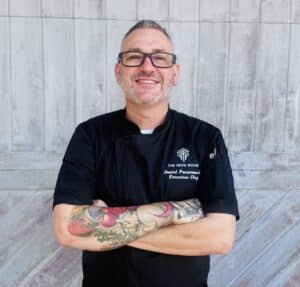
Executive Chef
Chef Daniel specializes in creating culinary programs that support healthcare and addiction recovery. With more than 20 years of culinary expertise, he now uses his passion for food as a tool for wellness, healing, and personal growth.
As someone in long-term recovery since March 3, 2019, and a proud alumnus of The Hope House, Daniel understands firsthand the power of second chances. Today, he inspires others by nourishing not only through food but also by sharing his story of resilience, hope, and the belief that recovery is within reach for everyone.
Chef Daniel brings his passion for recovery and wellness to life through beautifully crafted dishes. This gallery showcases his culinary creations that nourish both body and spirit.
A Culinary Program in rehab helps clients rebuild life skills, gain confidence, and support recovery through cooking and nutrition. Studies show cooking interventions improve self-efficacy and dietary habits, which are essential for long-term wellness.
By learning to prepare healthy meals, participants in a Culinary Program also strengthen independence and create positive daily routines. These skills not only promote physical health but also provide therapeutic benefits during addiction recovery.
Nutrition plays a powerful role in substance abuse and mental health recovery. After extended periods of addiction or unmanaged mental health challenges, the body is often depleted of essential vitamins, minerals, and energy sources.
A well-balanced diet helps restore these deficiencies, stabilizing mood, improving concentration, and supporting the brain’s natural healing process. By fueling the body with nutritious foods, clients gain the physical strength and mental clarity needed to fully engage in treatment and therapy.
Equally important is the experience of eating food that is both delicious and satisfying. Recovery can be overwhelming, and sharing meals that are flavorful and thoughtfully prepared creates moments of comfort, joy, and normalcy.
These positive food experiences reduce stress and can help clients reestablish a healthy relationship with eating—something often disrupted during active addiction or periods of depression and anxiety. The Hope House provides meals that are both nourishing and enjoyable, reinforcing the idea that recovery is not about deprivation, but about building a better quality of life.
Within recovery programming, food becomes more than just sustenance—it is part of the therapeutic process. Cooking classes, nutrition education, and communal dining can teach clients valuable life skills while also fostering connection with peers.
A consistent, nutritious diet not only supports physical health but also enhances emotional stability, resilience, and long-term recovery outcomes. When food is prioritized as part of treatment, it becomes a vital tool for healing the whole person: body, mind, and spirit.
At The Hope House, we believe recovery is about more than breaking free from addiction—it’s about rebuilding a healthier, more fulfilling life. Our comprehensive programs, including nutrition and culinary therapy, are designed to support the healing of the body, mind, and spirit.
If you or a loved one is ready to take the next step, The Hope House offers personalized treatment in a supportive and compassionate environment. Contact us today to learn how our team can help you start your journey toward lasting recovery.